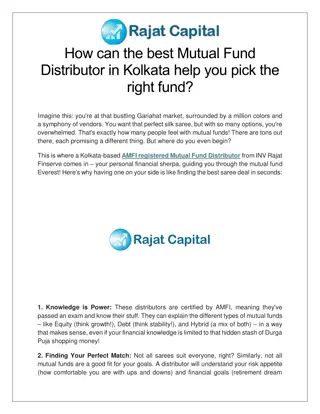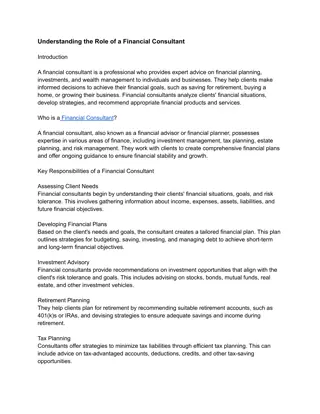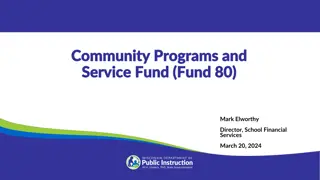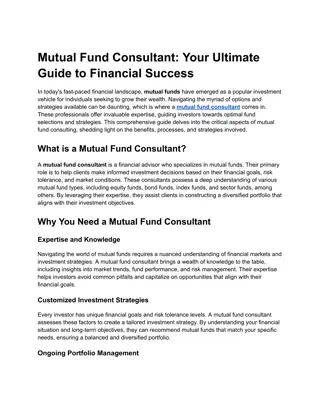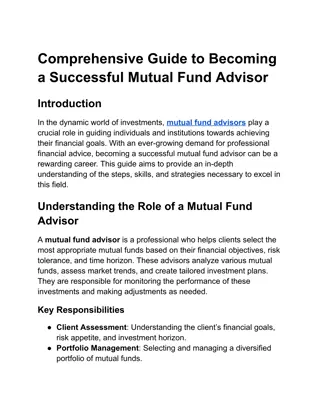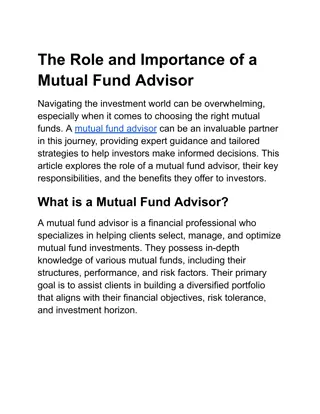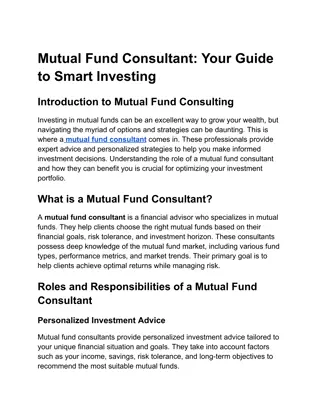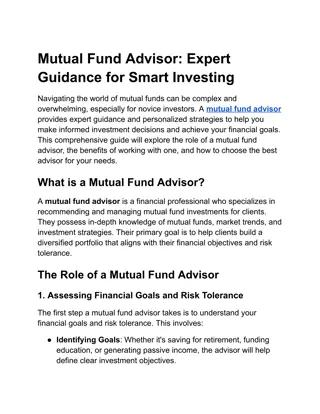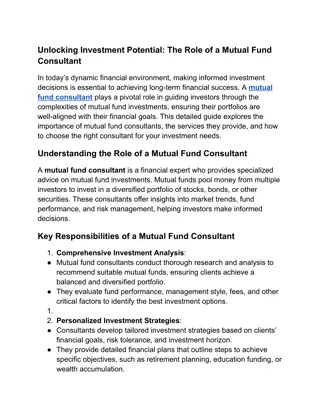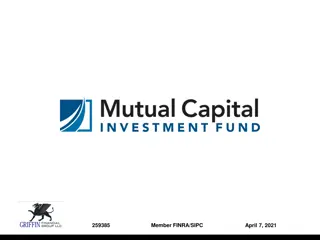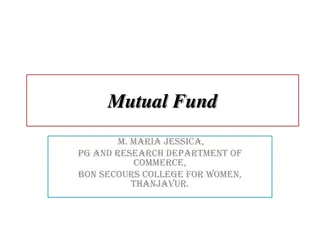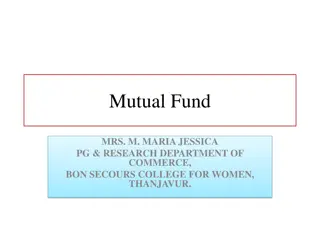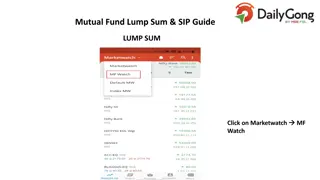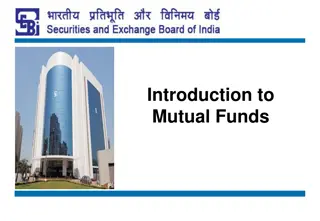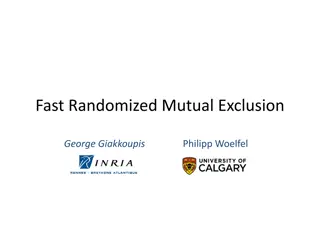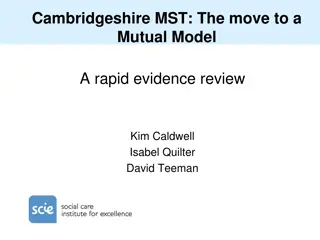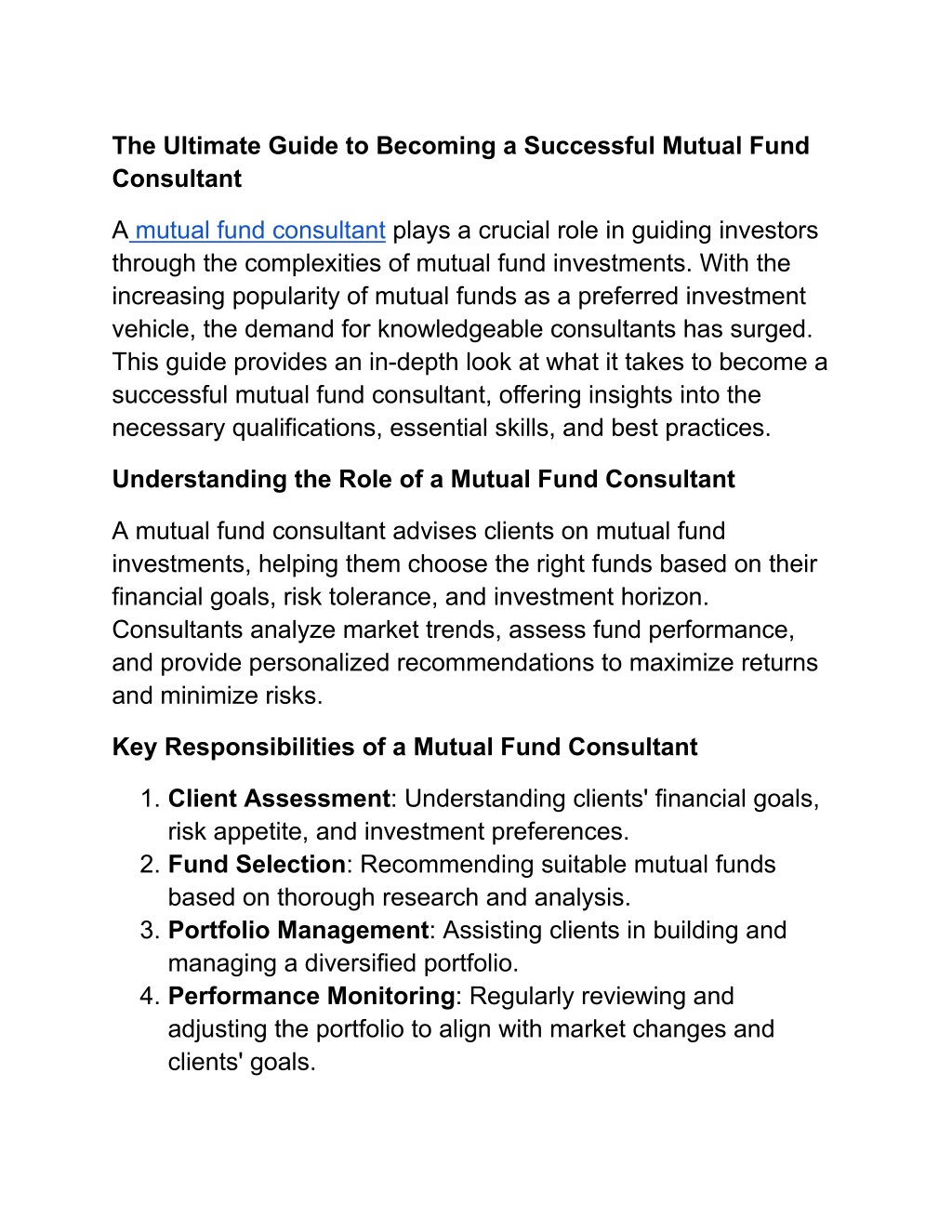
The Ultimate Guide to Becoming a Successful Mutual Fund Consultant
A mutual fund consultant plays a crucial role in guiding investors through the complexities of mutual fund investments. With the increasing popularity of mutual funds as a preferred investment vehicle, the demand for knowledgeable consultants has surged. This guide provides an in-depth look at what it takes to become a successful mutual fund consultant, offering insights into the necessary qualifications, essential skills, and best practices.
Uploaded on | 0 Views
Download Presentation

Please find below an Image/Link to download the presentation.
The content on the website is provided AS IS for your information and personal use only. It may not be sold, licensed, or shared on other websites without obtaining consent from the author. Download presentation by click this link. If you encounter any issues during the download, it is possible that the publisher has removed the file from their server.
E N D
Presentation Transcript
The Ultimate Guide to Becoming a Successful Mutual Fund Consultant A mutual fund consultant plays a crucial role in guiding investors through the complexities of mutual fund investments. With the increasing popularity of mutual funds as a preferred investment vehicle, the demand for knowledgeable consultants has surged. This guide provides an in-depth look at what it takes to become a successful mutual fund consultant, offering insights into the necessary qualifications, essential skills, and best practices. Understanding the Role of a Mutual Fund Consultant A mutual fund consultant advises clients on mutual fund investments, helping them choose the right funds based on their financial goals, risk tolerance, and investment horizon. Consultants analyze market trends, assess fund performance, and provide personalized recommendations to maximize returns and minimize risks. Key Responsibilities of a Mutual Fund Consultant 1. Client Assessment: Understanding clients' financial goals, risk appetite, and investment preferences. 2. Fund Selection: Recommending suitable mutual funds based on thorough research and analysis. 3. Portfolio Management: Assisting clients in building and managing a diversified portfolio. 4. Performance Monitoring: Regularly reviewing and adjusting the portfolio to align with market changes and clients' goals.
5. Education and Guidance: Educating clients about mutual funds, market trends, and investment strategies. Essential Qualifications and Certifications To excel as a mutual fund consultant, several qualifications and certifications are beneficial. These credentials not only enhance your credibility but also ensure you have the knowledge required to provide sound advice. Educational Requirements 1. Bachelor s Degree: A degree in finance, economics, business, or a related field is typically required. Courses in investment analysis, portfolio management, and financial markets are particularly valuable. 2. Advanced Degrees: While not mandatory, a master s degree in finance or business administration can provide a competitive edge. Professional Certifications 1. Certified Financial Planner (CFP): This certification is highly regarded in the financial planning industry and covers various aspects of financial planning, including investment strategies. 2. Chartered Financial Analyst (CFA): This designation focuses on investment management and provides in-depth knowledge of financial markets and investment analysis. 3. National Institute of Securities Markets (NISM) Certifications: For those operating in India, NISM certifications are essential for selling and advising on mutual funds.
Licensing Requirements Depending on your region, you may need specific licenses to operate as a mutual fund consultant. It is crucial to check local regulations and obtain the necessary licenses to practice legally. Building a Strong Skill Set Successful mutual fund consultants possess a range of skills that enable them to provide exceptional service and build lasting client relationships. Analytical Skills Consultants must analyze complex financial data, understand market trends, and evaluate fund performance to provide sound investment advice. Interpersonal Skills Strong communication and interpersonal skills are essential for building trust with clients. Consultants need to explain complex financial concepts clearly and maintain open lines of communication. Problem-Solving Skills The ability to identify potential issues and develop effective solutions is crucial. Consultants must be proactive in addressing clients' concerns and adapting strategies to changing market conditions.
Technological Proficiency Proficiency with financial software and tools is important for managing client portfolios, analyzing data, and generating reports. Staying updated with technological advancements can enhance efficiency and service quality. Developing a Client Base Building a robust client base is a key challenge for mutual fund consultants. Here are some strategies to attract and retain clients: Networking Networking is essential for growing your client base. Attend industry events, join professional associations, and connect with other financial professionals who can refer clients. Marketing Develop a strong marketing strategy that includes a professional website, active social media presence, and content marketing. Providing valuable content, such as blogs or newsletters, can establish you as an authority in the field. Referrals Satisfied clients are often the best source of new business. Encourage referrals by providing exceptional service and possibly offering referral incentives.
Educational Seminars and Workshops Hosting seminars and workshops on mutual fund investing can attract potential clients and showcase your expertise. Providing free educational resources can build trust and credibility. Continuing Education and Staying Updated The financial industry is dynamic, with constantly evolving regulations, market conditions, and investment products. Continuous education is vital for maintaining relevance and providing up-to-date advice. Industry News Regularly read financial news from reputable sources to stay informed about market trends and regulatory changes. Professional Development Attend workshops, seminars, and conferences to learn about the latest industry developments. Many certifications also require ongoing education to maintain credentials. Advanced Certifications Pursuing additional certifications can expand your expertise and offer more services to clients. Consider certifications in specialized areas such as tax planning, estate planning, or advanced portfolio management.
Ethical Considerations Adhering to ethical standards is crucial in building trust and maintaining a positive reputation. Always act in the best interests of clients, provide transparent and honest advice, and disclose any potential conflicts of interest. Conclusion Becoming a successful mutual fund consultant requires a combination of education, certifications, skills, and ethical practices. By continuously improving your knowledge, building strong client relationships, and staying informed about industry trends, you can excel in this rewarding career.



